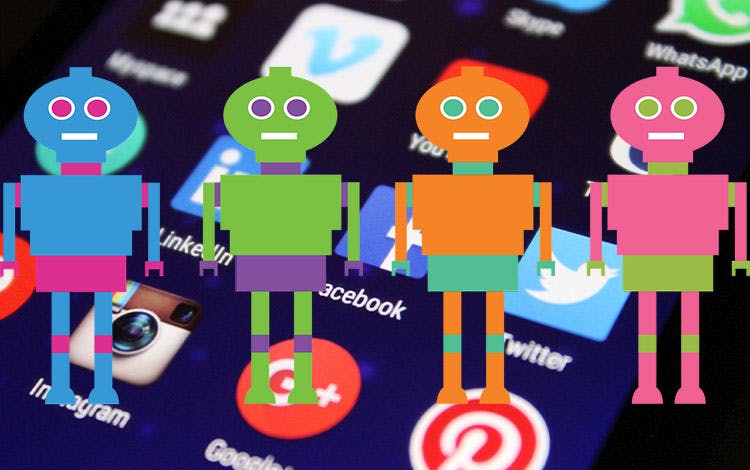The 2016 election got people thinking about the amount of misinformation that is out there. Particularly when it comes to social media, the incorrect info that's being spread has, to some extent, been a cause for concern. Social media bots seem to be right in the center of the controversy. A social media bot is an account with no human owner that functions on its own. It will post things as well as interact with other users within a given platform. Only about 65% of Americans understand what a social media bot is.
According to a 2018 Pew Research Center study, a vast majority of Americans have become increasingly concerned about this social media bot phenomenon. The concern is large with the fact that such bots are using sites and apps for malicious ends. Eight in ten of adults surveyed said that they did believe that the bots do more harm than they do good. Only a slim 17% say that social media bots are a positive thing.
In terms of being able to identify what a bot is, many Americans just aren't sure. They know that they exist, but only about 47% of surveyed can identify them. And less than ten percent of respondents say that they are very confident in their ability to identify such bots. To offer some perspective, in another Pew study, 85% said that they knew they could immediately recognize fake news.
Speaking of the news, most Americans seem to find the presence of social media bots in this arena pervasive and duplicitous. 81% of those surveyed believe that a good portion of the news that people read on social media does come from these bots. And 66% said across the board, social media bots have an overall negative effect on the platforms in which they are embedded.
Certainly, most, according to the findings, believes that social media bots are a cause for concern; however, some support social media bots being used for specific functions. For example, 78% said that it is perfectly fine to use the social media bots for the government to post emergency warnings and/or updates. This was the most popularly supported use for bots of the nine offered in the study. Bots being used for the political purpose was looked on rather negatively. And 92% of participants said they should not be used to spread fake news.
Most Americans Are of the Mindset that Social Media Bots are Malicious and Hard to Identify
In the Pew Research Center survey, the bots were defined as accounts which function "on their own, without human involvement, posting and performing other activities on social media sites." Of those surveyed only about 16% have heard of and/or know a lot about bots. 34% have never even heard of their existence. And thus have no familiarity with these types of accounts. The level of debate concerning these bots varies depending on a variety of factors.
Age is one such factor. Younger Americans from 18 to 49 have heard about social media bots more so than their older counterparts—roughly 78% of respondents in this age group know what a social media bot is. Only 58% of those between the ages of 50 and 65 have heard of or understand what a bot is. This pattern also can be seen when it comes to how much they know about social media bots. Those in the younger age group tend to understand quite a bit more about them than those in the older groups.
Education is yet another factor which impacts how much an individual may or may not know about bots. About 78% of those who have a higher education degree have heard about and/or understand some things about bots. For those with only a high school degree, that percentage hovers right around 55%. Party affiliation also has a small impact on bot knowledge. Democrats and independents are more likely than Republicans to know about social media bots—72% versus 61%.
Many Respondents Think Bots are Malicious and They Have Trouble Identifying Them
An overwhelming number (80%/) said that largely a social media bot has a negative purpose. While only 17% thought that bots functioned positively. Most agree that bots are put out there to spread misinformation.
Again, demographics do figure into how people tended to answer. For example, eight-in-ten Republicans, as well as Democrats who know of the existence of bots, do say that such are used only for negative purposes and the accounts are thus malicious. Those numbers came in at 84% versus 78%.
In terms of the age of respondents, eight in ten of those surveyed regardless of which age group they were in do think that bots are detrimental and are used primarily for bad purposes.
And when it comes to people's ability to identify a social media bot, there doesn't seem to be a great deal of confidence there. Only 47% of those asked said that they feel confident that they could detect a bot. Seven percent of the study's participants felt very confident that they could. On the other end of the spectrum, 38% said that they did not feel confident they could identify a bot. And fifteen percent did not believe they could detect one at all. Those in the younger age groups were more confident in their abilities to spot a social media bot. Six in ten of those asked who were between the ages of 18 and 29 felt quite confident that they could identify a bot. When this was asked of the older age groups, less than half said that they thought they could spot one.
At First Union, we want to see your business be successful. If you have any questions, call today to speak to one of our advisers!
